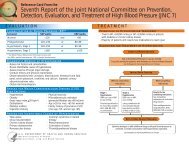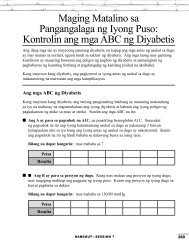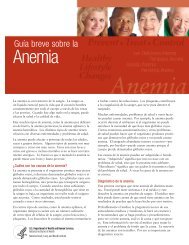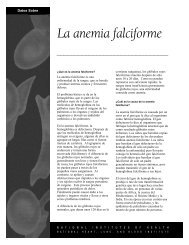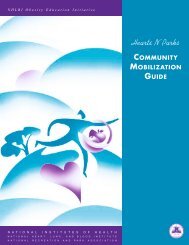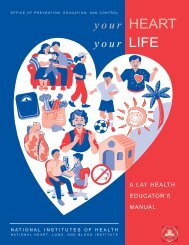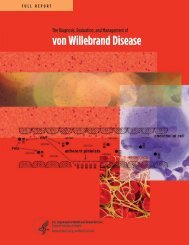WOMEN 'S HEALTH AND MENOPAUSE : - National Heart, Lung ...
WOMEN 'S HEALTH AND MENOPAUSE : - National Heart, Lung ...
WOMEN 'S HEALTH AND MENOPAUSE : - National Heart, Lung ...
You also want an ePaper? Increase the reach of your titles
YUMPU automatically turns print PDFs into web optimized ePapers that Google loves.
SHEP have shown that drug treatment reduces the<br />
incidence of stroke in hypertensive women. 167,168<br />
Current smoking is associated with an increased<br />
risk of stroke, and in the Nurses’ Health Study this<br />
increased the RR for ischemic stroke by 2.5. 224,225<br />
Diabetes mellitus doubles the risk of ischemic<br />
stroke, and also increases the mortality associated<br />
with stroke. Cardiovascular conditions such as<br />
abnormal left ventricular (LV) wall motion,<br />
increased LV mass, carotid artery stenoses, and<br />
atrial fibrillation are significantly associated with<br />
an increased risk of stroke. Although elevated<br />
blood cholesterol is not a powerful risk factor for<br />
stroke, lowering of LDL cholesterol with statins<br />
reduces stroke risk. A meta-analysis of the statin<br />
trials done for CHD risk reduction showed a statistically<br />
significant 29-percent risk reduction for<br />
stroke, accompanying the 33-percent risk reduction<br />
for CHD. 222,226 Transient ischemic episodes are also<br />
related to an increased risk of subsequent stroke. 227<br />
Use of HRT has been associated with a lower risk<br />
of fatal stroke, but no change in overall incidence<br />
of stroke, compared to nonusers. In the Nurses’<br />
Health Study, current hormone use was associated<br />
with an increased risk of ischemic, but not hemorrhagic,<br />
stroke. For all strokes, there was a doseresponse<br />
effect, with higher doses of estrogen<br />
associated with a higher risk. 228<br />
In terms of active treatment of stroke, there are no<br />
clear recommendations. Early administration of<br />
aspirin seems to reduce the stroke-related death<br />
and recurrence, as shown in the Chinese Acute<br />
Stroke Trial (CAST). 229,230 Where transient ischemic<br />
episodes and stroke are associated with atrial fibrillation,<br />
warfarin may reduce the risk of stroke. 231<br />
Carotid endarterectomy and aspirin therapy may be<br />
helpful in symptomatic severe carotid stenoses. 232<br />
The only clinical trial to assess the effect of continuous<br />
CEEs combined with MPA is the HERS<br />
trial. 233 Over a followup of 4.1 years, 149 women<br />
had 1 or more strokes out of a total of 2,763<br />
women. HRT was not significantly associated with<br />
risk of nonfatal or fatal stroke or transient ischemic<br />
attack. It was therefore concluded that HRT had no<br />
significant effect on the risk of stroke in this higher<br />
risk group of menopausal women with CVD.<br />
10. PERIPHERAL VASCULAR DISEASE<br />
Peripheral vascular disease occurs relatively commonly<br />
in women, and like all CVD, there is an<br />
accelerated incidence with age in women. 234<br />
Smoking is the most prevalent risk factor for<br />
peripheral vascular disease in women, as it is in<br />
men. 235 Insulin resistance,<br />
increased BMI, elevated fibrinogen,<br />
and elevated blood<br />
pressure are also risk factors.<br />
235–237 Cessation of smoking<br />
and treatment of the underlying<br />
metabolic problem, if possible,<br />
may lead to improvement.<br />
Peripheral vascular disease carries<br />
an increased risk for CHD,<br />
which is nongender-dependent.<br />
237 If surgery is indicated<br />
for severe peripheral vascular disease, smoking<br />
cessation is essential, and antiplatelet therapy may<br />
also be helpful. 238,239 There is an increase<br />
in risk of venous<br />
thromboembolic<br />
events in women<br />
taking estrogen<br />
compared with<br />
those that do not.<br />
The effect of HRT on peripheral<br />
vascular disease is not known.<br />
11. VENOUS THROMBOEMBOLISM<br />
Recent epidemiological studies and limited clinical<br />
trial data have shown consistently that there is an<br />
increase in risk of venous thromboembolic events<br />
in women taking estrogen compared with those<br />
that do not. The studies to date indicate that there<br />
may be a fourfold increase in RR initially, with a<br />
persistent twofold increase in risk thereafter. 240–243<br />
The increased risk for venous thromboembolism<br />
was similar in women using an estrogen plus a<br />
progestin. 240,243 In unselected women, observational<br />
studies report an annual incidence of 6–18 events<br />
per 10,000 in subjects of all ages; thus a twofold<br />
increase in risk due to HRT might result in an<br />
165



